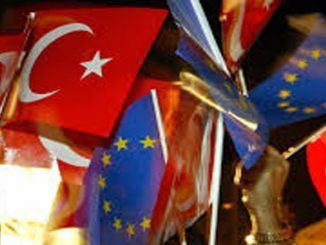
The U.S. is continuing to knock the ball out of bounds in relation to returning Gülenist Terror Group (FETÖ) leader Fethullah Gülen, while Turkey is continuing its net attitude on this matter.
U.S. media, which has been under Washington’s guidance until July 15, was claiming to its own public that Gülen’s extradition was wanted by President Recep Tayyip Erdoğan only. The reason behind the extradition request was frequently portrayed as a politically motivated conflict between “West’s ally good Gülen” and “West’s enemy bad Erdoğan.” As a matter of fact, there were editorials written many times in newspapers like The New York Times, suggesting to the U.S. administration that Gülen should never be returned.
After the coup attempt, the same media ignored the public’s persistence on the extradition of Gülen and tried to defend that this demand came from “political and media circles trying to shine up to Erdoğan.” When the Turkish public’s certain opinion that Gülen is behind the coup attempt in question and that he needs to be returned overcame the language barriers and reached the world, this time some of them dared to take on the Turkish public stressing that “anti-Americanism is on a rise in Turkey.”
While Washington continues to insist on “sufficient evidence” regarding Gülen’s return, it finally stated that relations between Turkey and the U.S. are one matter and the extradition issue is another matter. However, Ankara’s attitude on this issue is clear. Yesterday, Prime Minister Binali Yıldırım said, “We can have no other rapprochement with the U.S. than Gülen being handed over. The U.S. cannot pass this off,” putting forth once more the state’s position. Istanbul Chief Public Prosecutor’s office also sent a letter to the U.S. for Gülen’s preventive arrest. So the Gülen issue is a total red line for Turkey.
Gülen, who is being investigated for crimes such as attempting to oust the government of the Republic of Turkey or prevent it from doing its job, attempting to kill the president, destroy Parliament or prevent it from doing its job, attempting to eliminate the Constitution, damaging public property, injuring, planning to kill individuals for fulfilling their public duty, killing through indignation, depriving individuals of their freedom by using force, threat or deceit, was charged prior to July 15 with crimes such as establishing a crime network, deactivating the state mechanism, white collar fraud, fraud on official documents, slander, laundering crime-related asset values, liability, the violation of the privacy of personal life, eavesdropping on conversations between people and recording them and illegally recording personal data. The 1979 Treaty on Extradition and Mutual Assistance in Criminal Matters between Turkey and the U.S., requires the extradition of persons accused of such serious crimes and article 10 of this treaty required the temporary arrest of the person in question by the country to make the extradition. Even if the crime is committed by the culprit outside the borders of the country requesting the extradition, if the laws of the party to carry out the extradition stipulates the punishment of the same crime committed under similar conditions, it is required to carry out this extradition. While even one of the crimes committed by Gülen are of punishable nature in the event they are carried out in the U.S., kicking the ball out of bounds makes it seem like the U.S. is protecting the criminal alone, not the superiority of human rights and law.
According to the same treaty, if the crime is considered a political crime or if the recipient of the extradition request is of the opinion that the individual is wanted to be punished for their political views, they made reject the extradition request.
This matter is one of the reasons why various wrong claims that “Gülen is wanted for his opposing ideas, it is because of Erdoğan’s authoritarian attitude toward Gülen, Turkey is increasingly moving away from democracy,” have been stirred for a long time. However, even according to this treaty, crimes that are committed or were attempted to be committed against a state president or government leader or one of their family members, are not considered crimes of political nature. It is clear that the group founded and run by Gülen intended to kill Erdoğan, that in addition to Erdoğan the coup perpetrators also organized an armed attack on the vehicle in which Binali was present. This situation which is clearly stated in the treaty text can harm ties between any two countries, not only Turkey and the U.S.
What’s more is that according to the same treaty, the final decision maker is neither the prosecutors nor the Justice Ministeries but the Foreign Ministry. So, extradition, in terms of both countries, is a matter that concerns not law but foreign politics and the U.S. is going to decide whether to return Gülen not based on law, but its national interests which it holds above everything else, even law. While these national interests have even legitimized prisons like Guantanamo and authorities given to the CIA to interrogate with torture for the U.S., the human rights and democracy fuss made about Gülen’s extradition, the slander of the likelihood of torture and efforts to make the issue seem like a political conflict – I am sorry – look funny.
The U.S. administration needs to decide as soon as possible whether its ally is Gülen or the Republic of Turkey. As long as it passes this off or fails to extradite Gülen, the Turkish public’s opinion that the U.S. was behind the coup attempt and FETÖ was founded by the U.S. is going to become stronger. As long as Gülen is not arrested and freely continues his life and activities there, this opinion is going to become increasingly stronger. If Gülen dies while in U.S. borders, regardless of the way he dies, the idea that he was eliminated by the U.S. is one that Turkey will have no difficulty getting used to.
*Merve Şebnem Oruç is a Turkish journalist and columnist.
(Published in Yeni Şhafak on Sunday, August 14, 2016)



